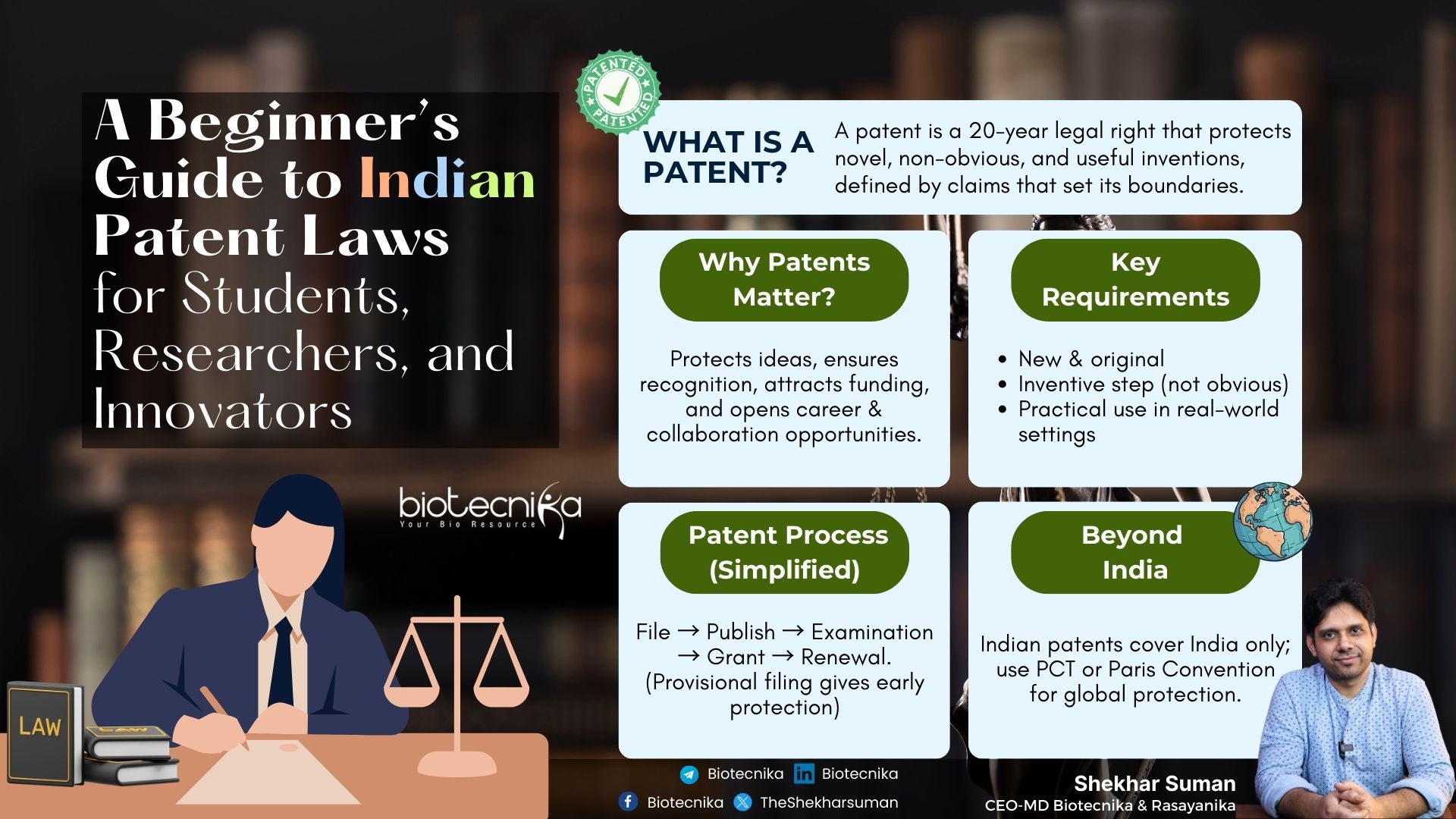Grasping Indian Patent Laws: A Brief Overview for Students & Researchers
In our world, where new ideas drive progress, coming up with a brilliant concept is no longer enough. If you’re a student working on a school project, a Researcher developing cutting-edge Technology, or part of a new company’s team, you need to know how to protect your inventions. This is where Patents come into play. In India, people are starting to view the Patent system as a vital tool for promoting Research, innovation, and the establishment of new Businesses.
Let’s delve into the workings of Indian Patent Laws and understand why every aspiring inventor should take note of this. This knowledge will empower you, giving you a sense of control over your inventions and their protection.
Table of Contents
What’s a Patent?
Under Indian Patent Laws, a Patent gives inventors Legal ownership of their novel and useful creations. Think of it as a certificate that grants you the sole right to make, use, sell, or allow others to use your invention in India for a set period of 20 years. It prevents others from copying your idea without permission, giving you a chance to profit from or build upon it without worrying about imitators.
To obtain a Patent, an idea must meet specific requirements. The invention must be novel and not previously disclosed to the public. It must include an inventive step, meaning it shouldn’t be evident to an expert in the field. It must have an industrial application, meaning it can be used or manufactured in real-life settings.
Why Should Students and Researchers Care?
Many people think that only big companies or professional inventors can obtain Patents, but that’s not true. Some of the most cutting-edge ideas come from university laboratories, team projects, and Doctoral Research. If you’ve come up with a one-of-a-kind method, tool, formula, or gadget, you can Patent it even if it’s part of your schoolwork or thesis.
Patents offer students and Researchers a valuable opportunity to gain recognition, secure funding and collaboration opportunities, and establish their presence in academic or professional circles. Increasingly, universities and funding organizations are evaluating IP output as a measure of innovative ideas and tangible, real-world impact.
Moreover, complying with Indian Patent Laws ensures that your effort is not overlooked or, even worse, stolen. It gives you control over how people use your invention and who is authorized to use it. This can be helpful if you plan to license or sell it later on.
Who Can Apply for a Patent?
The Indian Patent System is open to everyone. Whether you’re an individual, a team of Researchers, an organization, or a new company, you can submit a Patent application. You don’t need to be a big corporation or a top Scientist. This inclusivity is designed to encourage and support all innovators, regardless of their background or resources.
You can apply on your own or with others. People from other countries can apply for a Patent in India, either directly to the Indian office or through global filing systems, such as the PCT (Patent Cooperation Treaty).
What Kinds of Inventions are Patentable in India?
According to Indian Patent Laws, to qualify for a Patent, your invention must satisfy three core conditions:
- It must be new,
- Involve an inventive step, and
- Be capable of industrial application.
For instance, a new drug compound, an improved manufacturing process, or a machine with a novel function could all be Patentable. Examples of Patentable inventions in India include Pharmaceutical formulations, new industrial processes, and innovative devices.
However, Indian Patent Law does place some boundaries. Particular subject matter is not eligible for Patent protection, including abstract theories, Mathematical methods, Business methods, Computer Programs, and any subject matter that is contrary to public order or morality. Additionally, traditional knowledge and naturally occurring substances, such as herbal remedies, are not considered inventions and therefore cannot be patented.
This is designed to strike a balance between encouraging genuine innovation and avoiding monopolies over ideas that belong in the public domain.
How Does the Patent Process Work?
The Patent process in India, while detailed, is fairly systematic. It typically starts with drafting and submitting a Patent application. Patent filing in India follows a step-by-step process, beginning with a provisional application and moving towards a full specification. If your invention is still in progress, you can begin with a provisional application. This gives you a priority date and a 12-month period to refine and complete the invention before filing the full version.
Once the complete specification is filed, the application is published, typically after 18 months, unless an earlier publication is requested. After this, you must formally request the Patent Office to examine your application. This step is crucial, as your invention is assessed to determine if it meets all Legal and Technical criteria for a Patent.
The Patent examiner may issue objections or ask for clarifications. You, or your Patent agent if you’re using one, must respond to these within the given timeframe. If the application satisfies all conditions, the Patent is granted and listed in the official journal. Once granted, it becomes your Legal property.
The whole process can take a few years, but it is often well worth the effort, especially if the invention has strong commercial or societal potential.
Do You Need a Lawyer or Patent Agent?
Navigating the Indian Patent application process can be challenging for first-time applicants. While it’s possible to file a Patent application on your own, many inventors choose to work with registered Patent agents. These are professionals trained in Patent Law who can help draft strong claims, navigate Legal nuances, and effectively communicate with the Patent and Trademark Office. This can increase the chances of your Patent being granted and also help avoid Technical pitfalls.
For students and Researchers, the Patent application process can seem daunting. However, many institutions offer support through their IP cells or Technology transfer offices. These resources are designed to guide you through the process, providing workshops or partnerships with IP attorneys. You’re not alone in this journey.

Is It Expensive?
Patenting does involve some Patent fees in India, primarily government filing and examination fees, along with potential professional fees if you hire an agent. That said, India’s Patent fee structure is designed to be accessible. Lower rates are offered for individuals, startups, and educational institutions, and importantly, women inventors are entitled to a significant reduction in official fees. This initiative is part of India’s efforts to encourage inclusive innovation and support greater participation of women in Science and Technology, making the system more inclusive and encouraging early-career innovators to participate.
Moreover, various schemes and funding options, both Government and private, are available to support IP filings, especially for student-led or socially impactful innovations.
What Happens After Your Patent is Granted?
Once your Patent is granted, it’s officially your property. However, a Patent doesn’t enforce itself; you must actively monitor its use. If someone uses your invention without your consent, you can take Legal action. On the brighter side, you can also choose to license your Patent to companies, generating revenue or fostering partnerships. Some inventors also assign (sell) their Patents to third parties for a fee or stake in a venture.
To keep the Patent in force, you must pay annual renewal fees. If you fail to do so, the Patent will lapse, and the protection will end.
What if You Want Protection Outside India?
It’s essential to recognize that a Patent granted in India only protects your invention within the territory of India. If you want protection in other countries, you’ll need to file separate applications in those jurisdictions. This can be achieved through two main routes: the Paris Convention route or the more streamlined Patent Cooperation Treaty (PCT), which enables you to file a single international application that covers over 150 countries.
Final Thoughts: Why This Knowledge Matters?
Understanding Indian Patent Laws may not be the most glamorous part of your Research journey, but it’s one of the most empowering. A firm grasp of how Patents work gives you a head start in transforming your innovations into tangible value, be it in the form of a startup, academic recognition, or social impact.
With India positioning itself as a global innovation hub, Researchers and students stand at the frontier of this movement. By learning how to protect your inventions, you not only secure your ideas but also contribute to building a culture that values and rewards creativity.
So the next time you’re in a laboratory, a hackathon, or even your hostel room sketching a new idea, remember: if it’s novel, practical, and original, it might just be Patent-worthy.
And knowing how to protect it? That’s a game-changer.
FAQs – What Students Really Want to Know?
In fact, student Patents in India are rising as Universities actively encourage innovation and provide IP cell support.
-
Can students really file Patents, or is it only for leading companies?
Yes, students and Researchers can file Patents. Many Patents originate from University laboratories and Academic projects, providing young innovators with recognition and future opportunities.
-
How much does it cost to file a Patent?
Patent fees in India are student- and startup-friendly, with reduced rates for individuals, educational institutions, and women inventors. Support from IP cells can further lower costs.
-
What ideas are not patentable in India?
You can’t patent abstract theories, computer programs per se, Mathematical methods, conventional knowledge, or anything against public morality or order.
-
Does an Indian patent protect my invention globally?
No, Indian patents cover only India. For worldwide protection, you need to apply in other countries or use PCT.
-
Do I need a lawyer or Patent agent to apply?
Not necessarily, you can apply yourself. But working with a registered agent or using your university’s IP cell can make the process smoother and more successful.

































